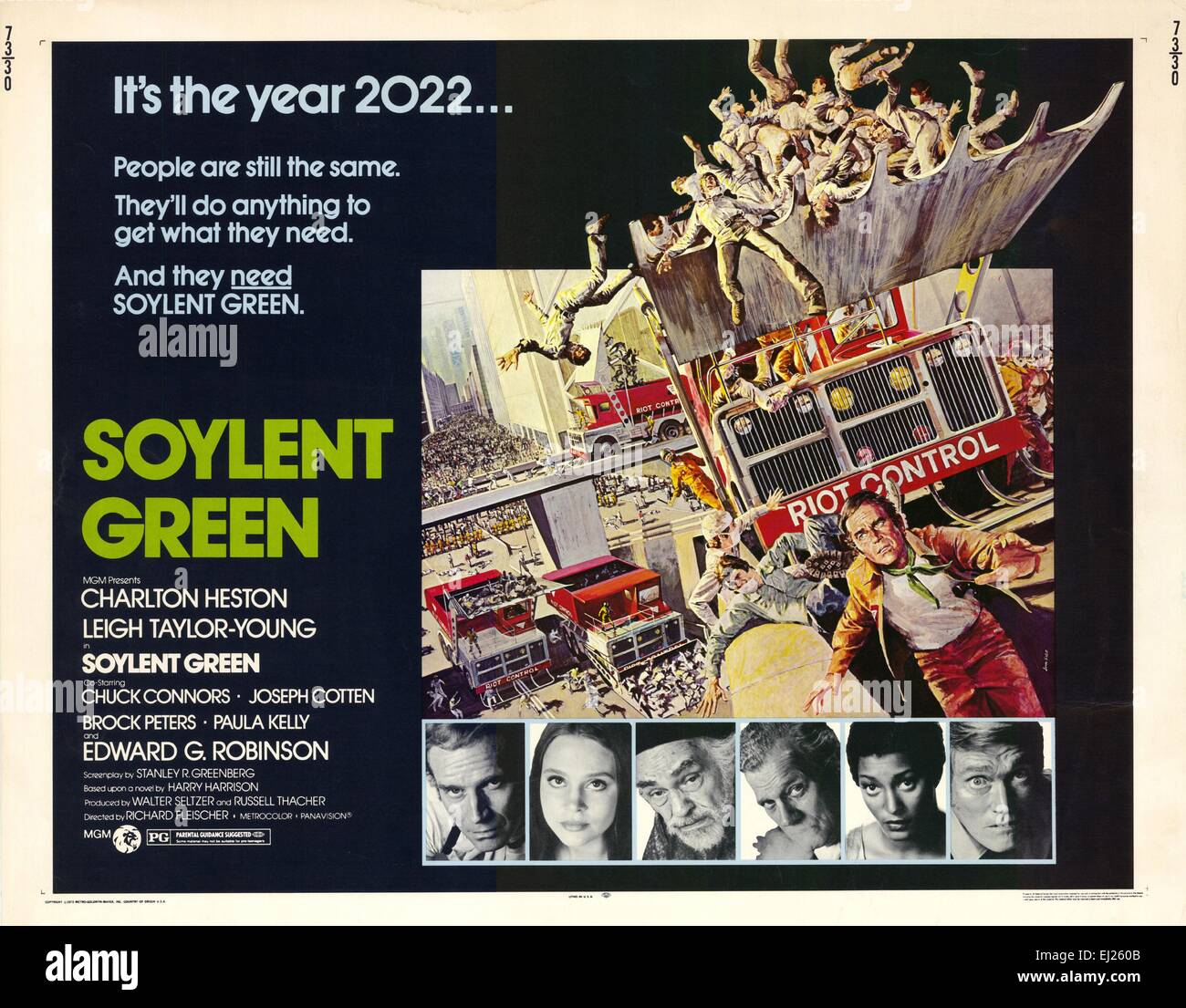← Back to Reviews
in
Soylent Green
The 1973 futuristic thriller Soylent Green looks a lot less like science fiction now than it did in 1973 and still provides some solid entertainment value despite an ending that we definitely see coming.

This film is set in the future, during a period where the world has been ravaged by the greenhouse effect, overpopulation, and dwindling food supplies. Only the extremely wealthy can afford to eat actual meat and a jar of strawberries cost $150. Most of the population is being fed courtesy of the Soylent Corporation, a food processing company that manufactures food substances from plankton in the oceans.

Charlton Heston plays a police detective named Thorn who is assigned to the case when the CEO of Soylent Industries (Joseph Cotten) is brutally murdered. While trying to get to the bottom of the murder, Thorn becomes involved with the CEO's "furniture" (Leigh Taylor Young) and learns that the CEO found out a deadly secret about the company and confessed about to a priest, a confession so important to be kept confidential that the priest ends up being murdered as well.

Director Richard Fleischer, whose resume includes such varied projects as 1967's Doctor Dolittle, Tora, Tora, Tora, and Fantastic Voyage really scored here with a dark and atmospheric crime drama that crafts a dark and disturbing future that might not be as far away as we might think. We see Thorn have to climb over dozens of people to get down the stairs of his apartment building. We also see him deliver some books to his friend and assistant Sol (Edward G. Robinson) for research dated 2015-2019. There's a lovely scene where Heston and Robinson sit down for the simple joys of beef, vegetables, strawberries, and scotch. Loved the look on Thorn's face when he is offered a hot shower and air conditioning.

Despite an overly melodramatic screenplay, Fleischer's atmospheric direction makes what happens here feel very real. Heston offers one of his best performances as the cynical police detective who is ignorant to life in the 20th century and Edward G. Robinson was robbed of a supporting actor nomination for his wise and winning Sol, who still remembers a world where people ate meat every day. The film features first rate production values and the minimal music score is quite effective, especially in Sol's "going home" sequence.
The 1973 futuristic thriller Soylent Green looks a lot less like science fiction now than it did in 1973 and still provides some solid entertainment value despite an ending that we definitely see coming.

This film is set in the future, during a period where the world has been ravaged by the greenhouse effect, overpopulation, and dwindling food supplies. Only the extremely wealthy can afford to eat actual meat and a jar of strawberries cost $150. Most of the population is being fed courtesy of the Soylent Corporation, a food processing company that manufactures food substances from plankton in the oceans.

Charlton Heston plays a police detective named Thorn who is assigned to the case when the CEO of Soylent Industries (Joseph Cotten) is brutally murdered. While trying to get to the bottom of the murder, Thorn becomes involved with the CEO's "furniture" (Leigh Taylor Young) and learns that the CEO found out a deadly secret about the company and confessed about to a priest, a confession so important to be kept confidential that the priest ends up being murdered as well.

Director Richard Fleischer, whose resume includes such varied projects as 1967's Doctor Dolittle, Tora, Tora, Tora, and Fantastic Voyage really scored here with a dark and atmospheric crime drama that crafts a dark and disturbing future that might not be as far away as we might think. We see Thorn have to climb over dozens of people to get down the stairs of his apartment building. We also see him deliver some books to his friend and assistant Sol (Edward G. Robinson) for research dated 2015-2019. There's a lovely scene where Heston and Robinson sit down for the simple joys of beef, vegetables, strawberries, and scotch. Loved the look on Thorn's face when he is offered a hot shower and air conditioning.

Despite an overly melodramatic screenplay, Fleischer's atmospheric direction makes what happens here feel very real. Heston offers one of his best performances as the cynical police detective who is ignorant to life in the 20th century and Edward G. Robinson was robbed of a supporting actor nomination for his wise and winning Sol, who still remembers a world where people ate meat every day. The film features first rate production values and the minimal music score is quite effective, especially in Sol's "going home" sequence.
